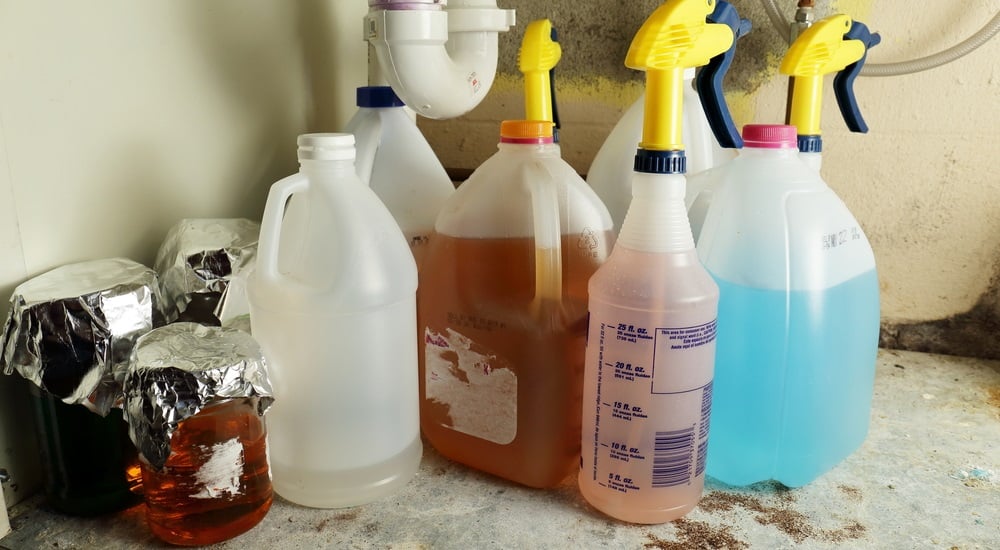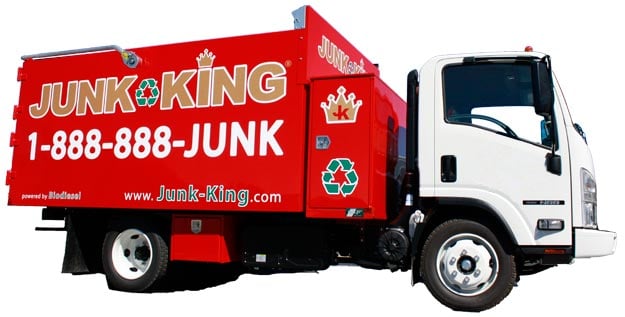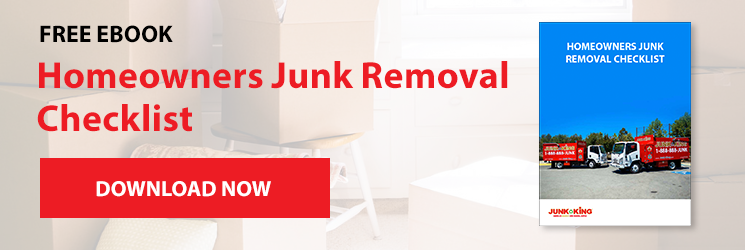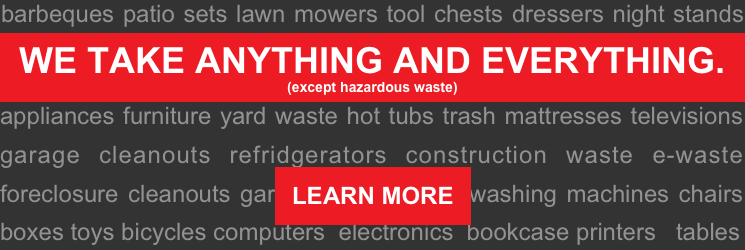
We may not think our homes have toxic or dangerous materials. But almost every household has products that, when disposed of, become hazardous waste.
In fact, one of the most significant challenges for waste management and junk removal is dealing with household hazardous waste.
Silent Killers Lurking Under the Sink
While that may sound a bit dramatic or exaggerated, the reality is that many household cleaning products and other materials are both toxic and hazardous.
So, what do we mean by that?
For starters, the EPA defines “hazardous waste” as,
“Hazardous waste is waste that is dangerous or potentially harmful to our health or the environment. Hazardous wastes can be liquids, solids, gases, or sludges. They can be discarded commercial products, like cleaning fluids or pesticides, or the by-products of manufacturing processes.”
In addition, the EPA considers many household products that can catch fire, react, or explode under certain circumstances, or that are corrosive or toxic as household hazardous waste.
There are numerous products that, when in use are perfectly safe, but when thrown out can be a potential hazard to the environment.
- That great cleaning solution that you love is quite likely to contain chemicals that, if allowed to seep into the ground, would be toxic to humans, animals, or plant life.
- All those batteries that were purchased right before Christmas will eventually die and need to be disposed of. But each one of them is a potential hazardous waste bomb.
- Oh, and some of the cosmetics, shampoo, and mouthwash you've been using are also considered hazardous waste under federal regulations.
In fact, many of these materials are banned from landfills and cannot be picked up and removed by your residential waste management service or even commercial junk removal companies.
Products, such as paints, cleaners, oils, batteries, and pesticides can contain hazardous ingredients and require special care when you dispose of them.
Here are some examples of household hazardous waste, HHW:
- Adhesives
- Certain types of paint
- Oil filters and used oil
- Batteries
- Antifreeze
- Household cleaners and polishes
- Certain cosmetics
- Insecticides
- Lighter fluid
Ideally, these products should go to special facilities when they are being gotten rid of where they can be stored, treated, and disposed of safely.
What to Do with Household Hazardous Waste
How you dispose of leftover household products is critical.
Improper disposal of hazardous household wastes (HHW) includes pouring them down the drain, outside on the ground, into storm sewers or drains, or even putting them out with the regular trash in some cases.
These disposal methods might not seem dangerous, but improper disposal of these wastes can pollute the environment and even pose a threat to human health. In fact, some types of HHW can potentially cause physical injury to sanitation workers, or contaminate septic tanks and wastewater treatment systems if poured down drains or toilets.
Closer to home, these waste products can also be a real hazard to children and pets if they're left around the house and are accessible.
Fortunately, for most of us, products in our homes that qualify as hazardous waste are going to be few and far between.
So, what does a homeowner do with this stuff?
Unfortunately, very few people can avoid purchasing potentially harmful products altogether, so it's important to know how to manage them properly.
The EPA offers these quick tips for the safe handling of household hazardous wastes:
- Follow any instructions for use and storage provided on product labels carefully to prevent any accidents at home.
- Be sure to read product labels for disposal directions to reduce the risk of products exploding, igniting, leaking, mixing with other chemicals, or posing other hazards on the way to a disposal facility.
- Never store hazardous products in food containers; keep them in their original containers and never remove labels. Corroding containers, however, require special handling. Call your local hazardous materials official or fire department for instructions.
- When leftovers remain, never mix HHW with other products. Incompatible products might react, ignite, or explode, and contaminated HHW might become unrecyclable.
- Check with your local environmental, health or solid waste agency for more information on HHW management options in your area.
- If your community doesn’t have a year-round collection system for HHW, see if there are any designated days in your area for collecting HHW at a central location to ensure safe management and disposal.
- If your community has neither a permanent collection site nor a special collection day, you might be able to drop off certain products at local businesses for recycling or proper disposal. Some local garages, for example, may accept used motor oil for recycling. Check around.
- Remember, even empty containers of HHW can pose hazards because of the residual chemicals that might remain so handle them with care also.
Become Less Reliant on Hazardous Waste Products
With a little research and intentional consumerism, you can reduce your usage of household products that contain toxic or hazardous ingredients.
Of course, you can’t go without prescription medications and even some types of commercial cleaners, but there are ways you can become less dependent chemical-based products.
Here are some other ways you can become less reliant on hazardous products:
- Instead of using furniture polish, add a teaspoon of lemon juice to a glass of vegetable oil.
- Mix a tablespoon of lemon juice with 16 ounces of water to clean windows and balustrades.
- Soak carpets with baking soda for 15 minutes before vacuuming instead of using a rug deodorizer.
- Boil two inches of water with a teaspoon of baking soda, a teaspoon of salt and a sheet of aluminum foil in a shallow pan for a maximum of five minutes to make homemade silver polish.
The less reliant you use potentially hazardous products, the less waste you’ll generate, and consequently, less potentially harmful chemicals can end up in our water, atmosphere and landfills.
The Easy Way to Dispose of Non-Hazardous Waste
At Junk King, we know it can often be confusing when it comes to household hazardous waste and how to dispose of it. Regardless of where you live, however, you can call Junk King for more information and guidance on your local restrictions and disposal options.
And, when it comes to all the other waste, garbage, junk and debris around your home, we're here to take that off your hands quickly and easily.
Whether you are renovating your home or preparing for the spring, we provide our customers with the tools they need to get rid of unwanted junk. Our professional and friendly crew can do the heavy lifting and hauling for you or, if you prefer to take a few days to pile up your trash and junk yourself, you can do that with one of our convenient MINI Dumpster rentals.
Either way, we have the best solutions for you.
After you call, our expert and insured trash removal team will call 15 minutes before we arrive at your home. And once we arrive we’ll give you a free estimate based on how much room your items take up in our truck.
Then you just point and we’ll haul your items into our junk removal trucks, all with no hidden fees.
Ready to get rid of that junk? It’s as simple as 1, 2, 3. You make an appointment by booking online above or by calling 1.888.888.JUNK (5865).





